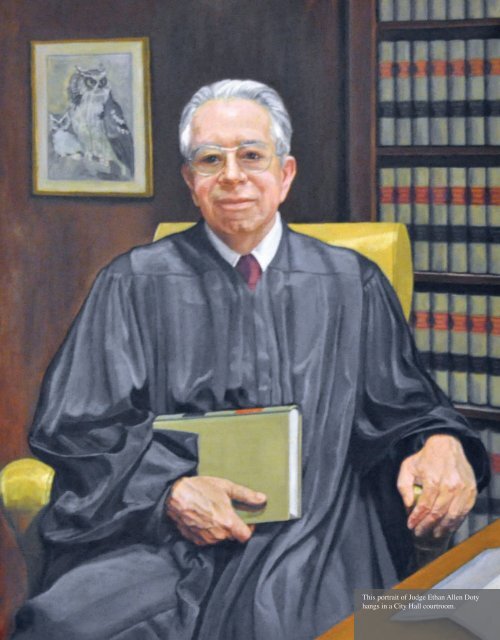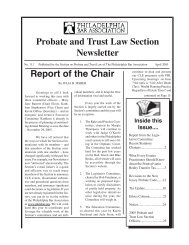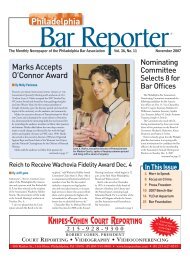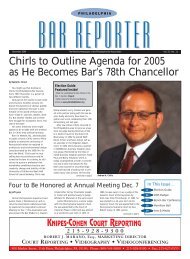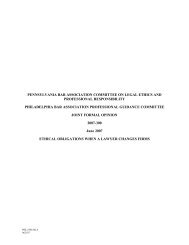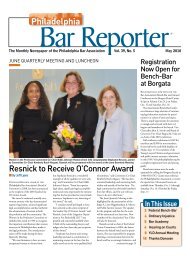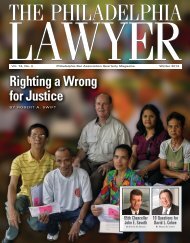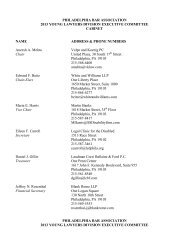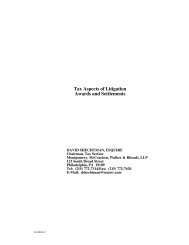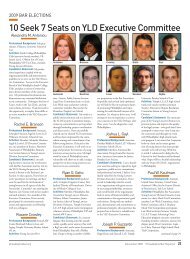Judge Ethan Allen Doty - Philadelphia Bar Association
Judge Ethan Allen Doty - Philadelphia Bar Association
Judge Ethan Allen Doty - Philadelphia Bar Association
You also want an ePaper? Increase the reach of your titles
YUMPU automatically turns print PDFs into web optimized ePapers that Google loves.
This portrait of <strong>Judge</strong> <strong>Ethan</strong> <strong>Allen</strong> <strong>Doty</strong><br />
hangs in a City Hall courtroom.
A Man of Many Primes<br />
<strong>Judge</strong> <strong>Ethan</strong> <strong>Allen</strong> <strong>Doty</strong><br />
By Michael J. Carroll<br />
If Psalms 90 allows three score and 10 – 70 years<br />
of life – <strong>Judge</strong> <strong>Ethan</strong> <strong>Allen</strong> <strong>Doty</strong> beat the Biblical<br />
odds. Not just in being alive two decades beyond his<br />
due, but in fully living his years.<br />
I did not know <strong>Judge</strong> <strong>Doty</strong> in his prime. Let me rephrase. I<br />
did not know him in his prime as a young man or even in his<br />
middle-age prime. A man like <strong>Ethan</strong> <strong>Allen</strong> <strong>Doty</strong> must have<br />
had many primes. I knew him in his elderly prime. His senior<br />
judge prime. I knew him when he was in his 80s and then 90s.<br />
I knew him in one of his primes.<br />
Physically, he was a small, slight figure by then. A shrinking<br />
figure, as aging men tend to be, but with a twinkle of life in<br />
his eyes. He was not at all ready to leave life, not even ready<br />
to leave the bench. At the risk of invoking clichés – which are<br />
sometimes quite accurate and useful – there was a bit of the<br />
giant in and about him. I don’t know whether it is accurate to<br />
say moral giant or just a giant of personality. Maybe a giant<br />
who had spent four score and 10 years in this world working<br />
hard, fairly and honorably.<br />
I do not know what he was like in the Clark/Dilworth reform<br />
years in 1950s <strong>Philadelphia</strong>. Probably more of a politician<br />
than in later years. The record lists him as a delegate to the<br />
1948 Democratic Convention that was held in <strong>Philadelphia</strong>.<br />
That was the year that Democrat Harry Truman was supposed<br />
to lose to Thomas E. Dewey who was nominated by the<br />
Republicans in their own <strong>Philadelphia</strong> convention. Truman,<br />
who had succeeded Franklin D. Roosevelt when he died in<br />
office, forgot to read the polls, or at least declined<br />
to follow them and was elected to his own term as<br />
president.<br />
At that ’48 Convention, Henry Wallace,<br />
another former vice president under Roosevelt,<br />
challenged Truman from the party’s left. Dixiecrat<br />
segregationist Strom Thurmond challenged<br />
Truman from the right, before storming out in a<br />
states-rights huff. That was <strong>Ethan</strong> <strong>Allen</strong> <strong>Doty</strong>’s convention.<br />
I suppose it is generally known how one becomes a<br />
<strong>Philadelphia</strong> judge. Often the process is not easy or pretty.<br />
<strong>Ethan</strong> <strong>Allen</strong> <strong>Doty</strong> was appointed to the <strong>Philadelphia</strong> bench in<br />
1958, nominated without opposition in 1959 and re-elected<br />
in 1969. He served until 1996, almost 40 years on the bench.<br />
Politician, patrician reformer, or both, inside that young<br />
man must have been the core of the old man I came to know.<br />
A dean of the <strong>Philadelphia</strong> criminal defense bar who began<br />
to practice law around the time the <strong>Judge</strong> <strong>Doty</strong> was appointed<br />
to the bench, recalled the judge as tough, sometimes even rigid<br />
in his early years on the bench, and much more understanding<br />
of the prosecution than of the defense. One story said that he<br />
threatened to fine a member of the court staff for putting two<br />
initials instead of his full first and middle name on the brass<br />
nameplate that rested on the bench and identified the judge<br />
to the world. Fact or legend, right, wrong, or somewhere in<br />
between, people change over time, sometimes seemingly<br />
drastically. But a good seed did not likely germinate on barren<br />
ground.<br />
<strong>Judge</strong> <strong>Doty</strong> was “The Arbitration <strong>Judge</strong>” when I first<br />
appeared before him. Arbitration in the <strong>Philadelphia</strong> Court of<br />
Common Pleas is intended to resolve cases without a timethe<br />
philadelphia lawyer Spring 2012 33
consuming and costly trial before a judge or jury. Arbitration<br />
panels made up of three lawyers hear and decide cases<br />
relatively quickly and cheaply. Either side can appeal to a<br />
judge or jury if unhappy with the decision.<br />
Lawyers being lawyers and the law being the law, there<br />
were sometimes disputes that threatened to delay or bring<br />
things to a halt. That is where <strong>Judge</strong> <strong>Doty</strong> came in. To keep<br />
things moving smoothly and fairly and if that failed, to at least<br />
keep things moving. <strong>Judge</strong> <strong>Doty</strong> was there to umpire, to make<br />
quick calls and force the players back into the game.<br />
I have represented poor residential tenants for somewhere<br />
between one and two score years. I met the judge because<br />
eviction appeals were then heard by arbitration panels. More<br />
than once he was charged with deciding whether my tenant<br />
client could present a defense to eviction and stay in the rented<br />
home while she defended. In law as in life, things often come<br />
down to money. Whether my client could avoid eviction into<br />
the street sometimes depended on whether she had deposited<br />
the required rent money during the<br />
appeal.<br />
Alas and alack, my clients were all<br />
poor. Sometimes all the money that<br />
should have been deposited was not.<br />
I remember one February day when<br />
two eager young associates of a big<br />
firm scurried into <strong>Judge</strong> <strong>Doty</strong>’s court<br />
to pursue the speedy eviction of my<br />
tenant client who had the misfortune<br />
of living in a house owned by the<br />
wife of a senior partner of the firm.<br />
Their arms looped under stacks of<br />
books seldom seen in landlord tenant<br />
court. Eager, beyond eager, they were<br />
thrilled to be going into a courtroom to<br />
do something more than carry the bag<br />
of a senior attorney and slide across<br />
the tabletop documents demanded.<br />
They were going to try a case, or at<br />
least make a sound, persuasive and<br />
scholarly legal argument to a judge.<br />
An elderly judge to be sure and not<br />
as sharp to their own hungry eyes as<br />
the Olympus-dwelling partner who dispatched them on their<br />
eviction mission. Likely bidding them to return with their law<br />
book victory shields or on them like the Spartans of old.<br />
“Your Honor,” the tall lanky one began.<br />
“Your Honor, this tenant is abusing the court and the legal<br />
system. She remains in my client’s property during the appeal<br />
without paying rent. We now doubt… we allege and aver…<br />
that she is not depositing the required rent into an escrow<br />
account. We demanded proof, but she refused to provide it.<br />
She has given us no proof of payment because…because…<br />
ah…on information and belief, she does not have the money.<br />
We ask that Your Honor terminate the supersedeas, the stay of<br />
eviction, and that she be evicted immediately. We ask that my<br />
client be restored to possession of the house she owns.”<br />
I rose to respond. What to say? He was right that my client<br />
did not have the money. She had no money for escrow or for<br />
anything else. But I had to say something. Had to break his<br />
“The time to check<br />
out a tenant is<br />
before you rent.<br />
Once the tenant is<br />
in well, if you have<br />
problems, then<br />
it’s too late. If you<br />
don’t check out the<br />
tenant, you have only<br />
yourself to blame.”<br />
flow, if flow it was. Besides, I was tired of listening to him.<br />
“Your Honor, I feel it is important to point out…”<br />
I paused for a moment and reflected again upon what exactly<br />
I could point out. Hardship? Usually true with my clients.<br />
Certainly true with this worn, rail thin, middle-aged woman<br />
from one of the river wards, who looked up at me calmly with<br />
a hapless smile on her too soon age-weathered face.<br />
Before I could resume my own brilliant legal argument I<br />
heard the judge gently interrupting me.<br />
“Now, now counselor, just hold for a moment. You can sit<br />
down. I have a question myself for your adversaries.”<br />
“Gentlemen,” he began as he swiveled his chair and then<br />
leaned his body in their direction.<br />
“Gentlemen, if you please, what is the temperature out<br />
there?”<br />
Stunned silence from the young legal eagles. They scanned<br />
each others eyes for help but found none. They looked at the<br />
stack of law books. No help there either.<br />
I saw my opening.<br />
“Your Honor, it was 17 degrees<br />
this morning when I came to work.”<br />
“Seventeen degrees...17 degrees...”<br />
he repeated, as his eyes narrowed and<br />
his grey-topped head began to move<br />
slowly from side to side. He swiveled<br />
again in his chair and rolled ever so<br />
slightly in the direction of my client.<br />
He seemed to look mostly at her as<br />
he again started to speak.<br />
“I am not putting anyone out when<br />
it is 17 degrees. When can we bring<br />
this case back?”<br />
“Two weeks, judge,” a short stout<br />
woman shot back from her seat at the<br />
small side table placed perpendicular<br />
to what passed for a judge’s bench at<br />
the Arbitration Center.<br />
“Very well, gentlemen. I will see<br />
you all back here at 10 a.m. two<br />
weeks from today.”<br />
The two young associates<br />
muttered as they shoved books into<br />
wide rectangular leather-covered boxes with handles, boxes<br />
that were one part briefcase and two parts suitcase. I had<br />
considerably less to carry in my own small bag as I slid my<br />
free hand lightly under the elbow of my client and led her<br />
outside.<br />
“And by the way gentlemen,” the judge called as the lawyers<br />
headed for the door.<br />
“The time to check out a tenant is before you rent. Once the<br />
tenant is in… well, if you have problems, then it’s too late.<br />
If you don’t check out the tenant, you have only yourself to<br />
blame.”<br />
The advice was lost on the young landlord attorneys.<br />
Frustration with losing before an old judge – four score years<br />
by reason of strength. Losing with a judge who did not fully<br />
understand their sound, perhaps brilliant legal argument, had<br />
left them deaf to advice.<br />
In the busy hallway the associates recovered the cynical<br />
34 the philadelphia lawyer Spring 2012
anter and bluster they had displayed<br />
before the hearing. They rolled eyes<br />
and made faces to each other as they<br />
cast a backward glance at the judge. I<br />
would have liked to be a fly on the wall<br />
to hear their scathing critique of an old<br />
senile judge when they returned to the<br />
office. No points scored with the senior<br />
partner that day.<br />
Maybe it was not written so clearly<br />
in the law books. Certainly we should<br />
be a government of laws and not men.<br />
Was the judge’s decision based on<br />
law? Likely. Based on equity? Most<br />
probably. Resting on justice? Certainly.<br />
In addition to law and equity, shouldn’t<br />
the law have a heart, a warm heart on a<br />
frigid <strong>Philadelphia</strong> day?<br />
Back in the courtroom the clerk<br />
quickly and efficiently steered the next<br />
set of litigants to the judge. She was so<br />
much more than a passive assistant in the<br />
judge’s courtroom. She sometimes had<br />
to step in to protect her nonagenarian<br />
boss. A few months earlier, after a hotly<br />
contested hearing the judge had made<br />
his ruling. The losing side tried to prod,<br />
bully and confuse the old judge into<br />
changing his mind and his ruling. The<br />
judge with eyes almost closed, seemed<br />
to be considering that for a moment<br />
until he was interrupted by the whisper<br />
of his assistant.<br />
“You’ve ruled now judge and that’s<br />
it. You’re only going to get yourself in<br />
trouble.”<br />
The judge blinked a few times, stared<br />
off at something only he seemed to see,<br />
then came back strongly with both feet<br />
in bounds.<br />
He cleared his throat and then<br />
bounced his recovered and renewed<br />
voice from the front to the back of the<br />
courtroom:<br />
“The court has ruled. You have 30<br />
days to appeal, if you wish.”<br />
Case closed.<br />
h<br />
There was also the day that the same<br />
court attendant disarmed the landlord<br />
who had a holstered handgun on his<br />
hip. He was using it to not so subtly<br />
intimidate his cowed tenant just outside<br />
<strong>Judge</strong> <strong>Doty</strong>’s courtroom. As soon as<br />
the judge’s courtroom assistant found<br />
out what was going on, she approached<br />
the armed landlord who eclipsed her<br />
greatly in height and bulk. He towered<br />
over her as she unrolled a brown paper<br />
bag and fanned her hand back and forth<br />
inside it to give it shape and space.<br />
“You put that gun in there right now,<br />
sir,” she firmly ordered.<br />
Like a young schoolboy caught<br />
with contraband chewing gum by the<br />
principal, he quickly and sheepishly<br />
complied.<br />
“You’ll get it back when you leave<br />
court. Not before.”<br />
h<br />
One of my last memories of the judge<br />
was in the then famous, now largely<br />
forgotten “Ice Storm ’94.” Several<br />
inches of thick clear ice covered the<br />
city with a smooth slippery January<br />
shell. Beautiful, dangerous, and for<br />
a few, deadly. Traffic came to a near<br />
standstill and hospital emergency<br />
rooms filled with patients with broken<br />
bones to be set. One old judge braved<br />
the sidewalks of Center City, moving<br />
briskly through City Hall and then the<br />
various downtown court buildings,<br />
searching in vain for a courtroom that<br />
needed a judge. None needed because<br />
there were no jurors, lawyers, or clients.<br />
There was almost no one there at all but<br />
the judge – by reason of strength.<br />
<strong>Judge</strong> <strong>Doty</strong> a Mentor for a Lifetime<br />
I first met <strong>Judge</strong> <strong>Ethan</strong> <strong>Allen</strong> <strong>Doty</strong> in the early 1970s, when<br />
I had just entered my teens. I was a young stamp collector<br />
and he was president of the <strong>Philadelphia</strong> Stamp Club. He<br />
was a gentle man who became a longtime friend. At that<br />
point, the fact that he was a judge really didn’t impress me.<br />
What did impress me was his calm, and his love of stamp<br />
collecting. Interestingly, <strong>Judge</strong> <strong>Doty</strong> collected stamps and<br />
other material from the Civil War, yet he preferred to avoid<br />
“controversial material.”<br />
When I passed the bar, <strong>Judge</strong> <strong>Doty</strong> seemed to be involved<br />
in all aspects of my career. We first crossed paths when he<br />
served as administrative judge for the Arbitration Center.<br />
Whenever I appeared before the judge, he seemed to rule<br />
against me – which I always attributed to his desire not to<br />
show favoritism toward me.<br />
It was in 1986, just after my wedding, that <strong>Judge</strong> <strong>Doty</strong><br />
took on a new role in my life – a guardian angel. Upon<br />
graduating from law school in 1984, I had worked for a<br />
small personal injury firm, and was miserable. As a result, I<br />
left that position and began a search for greener pastures.<br />
My search led me back to <strong>Judge</strong> <strong>Doty</strong>, who suggested<br />
calling Ed Chacker, whose firm, Gay & Chacker, was hiring.<br />
Ed and I hit if off, and I was offered a job; but I was also<br />
offered a position at another firm. It was <strong>Judge</strong> <strong>Doty</strong> who<br />
strongly advised me to go to Gay & Chacker,<br />
which he called an “up-and-coming firm.” I took<br />
the position, became a partner, and spent 15<br />
years there. Although I have since left the firm,<br />
I remain close friends with my former colleagues, and it is<br />
clear that my career owes much to <strong>Judge</strong> <strong>Doty</strong>.<br />
But it remains the less public memories of <strong>Judge</strong> <strong>Doty</strong><br />
that linger with me. In stamp collecting, he found a peaceful<br />
respite, but he became very upset when some members of<br />
his stamp club, including me, chose to leave because other<br />
members of the club had created an atmosphere of bigotry<br />
and hatred. <strong>Judge</strong> <strong>Doty</strong> worked hard to mend fences and it<br />
is because of him that the club still exists.<br />
And finally, I remember vividly his devotion to his wife Bea.<br />
She was a lovely, quiet and charming woman, whom he<br />
adored. Bea died in 1995, but had been ill for many years,<br />
and <strong>Judge</strong> <strong>Doty</strong> visited her and was by her side, regardless<br />
of whether she knew he was there. He was never the same<br />
after she died. When <strong>Judge</strong> <strong>Doty</strong> died in 1997 at the age of<br />
91, the memorial service was held at the Unitarian Society of<br />
Germantown. Although many of the judge’s contemporaries<br />
had passed, attendees included members of the bench and<br />
bar from many generations. Each had a similar memory – of<br />
a gentle man and a judge, who wanted nothing more than to<br />
treat every person in his courtroom, or in his stamp club, or<br />
wherever he met them, with fairness and grace.<br />
- By Daniel J. Siegel<br />
the philadelphia lawyer Spring 2012 35
h<br />
Finally, a different sort of memory, maybe one more<br />
connected to the young <strong>Ethan</strong> <strong>Allen</strong> <strong>Doty</strong> convention delegate<br />
than to <strong>Judge</strong> <strong>Doty</strong>. A memory I am still trying to figure out.<br />
Maybe if my father had been alive he could have decoded<br />
it for me since he dabbled in politics as a young man, when<br />
politics as the cliché goes, was a contact sport. I refer to the<br />
time that the judge invited me to address his social club. Like<br />
many American men’s clubs of that generation, it was named<br />
for a large wild animal. To this day, I am not sure why the<br />
judge asked me to come to the meeting. Maybe it was a slow<br />
night. Maybe the original invited speaker cancelled at the last<br />
minute. I will never know.<br />
I see that night now though a soft warm lens, a bit like the<br />
James Joyce story, “Ivy Day in the Committee Room.” Unlike<br />
in the short story, no one at the judge’s gathering was trying<br />
to coax to life a fire to ward off the damp chill. No one was<br />
licking wounds over election losses, complaining about not<br />
being paid for canvassing, or mourning past national political<br />
heroes betrayed and ruined. Yet the political and emotional<br />
atmosphere was somehow similar.<br />
The meeting was just outside the city in a roadside 18th<br />
century inn, in a room that had been so altered that it passed<br />
easily for mid 20th century. The lighting was subdued to<br />
dimness. Bits of ancient woodwork clashed with inexpensive<br />
modern wooden paneling. Unfolded and arranged in rows<br />
were more grey metal chairs than members in attendance.<br />
Floating in the air was a scent of dated, almost extinct<br />
politics. A <strong>Philadelphia</strong> last hurrah. Everybody except for<br />
the judge was no longer a somebody, but had once been a<br />
somebody. I being the only apparent exception, not ever<br />
having been a somebody or in danger of becoming one.<br />
Several club members – and truth be told – there were<br />
only several all together – several were former officeholders<br />
and by definition politically savvy and connected, or at least<br />
connected once. A former sheriff...a former ward leader…<br />
What did the judge have in mind in inviting me? An<br />
opportunity to meet people who might do something for me,<br />
help me along in life? Give them a chance to size me up? It<br />
was a pleasant meeting but there was no follow up on either<br />
end. Nice old guys, something to aspire to be.<br />
I still have the small statuette of the animal for which<br />
their club was named, presented to me by the smiling judge<br />
as I bowed away from the podium. His paternal smile was<br />
complemented by that twinkle in his eyes as he shook hands.<br />
There was modest polite applause and thanks at the end.<br />
A statuette souvenir of the night and possibilities? Maybe<br />
closer to it, a paraphrase of Freud’s cigar remark. Sometimes<br />
a statuette is just a statuette. The days of our years are after<br />
all numbered.<br />
Michael J. Carroll (mcarroll@clsphila.org), a public interest<br />
attorney in <strong>Philadelphia</strong>, is a member of the Editorial Board of The<br />
<strong>Philadelphia</strong> Lawyer.<br />
36 the philadelphia lawyer Spring 2012
A Gold Mine<br />
of Valuable Tips, forms, and how-to instructions<br />
Collecting & Enforcing Judgments in Pennsylvania Sixth Edition<br />
Designed for every practitioner who represents clients with debts to collect, this practical manual is your guide to execution<br />
practice in Pennsylvania. The book contains a comprehensive review of the substantive law in this area, including an<br />
analysis of both state and federal restrictions on debt collection practices as well as practice under the Uniform Fraudulent<br />
Transfer Act. In addition, this extensive guide comes with a searchable CD-ROM that contains the entire contents of the<br />
book and numerous forms.<br />
Contents<br />
• Execution Practice: Enforcement of Money Judgments<br />
from Law Books to Street Justice<br />
• Creation, Perfection, Priority, and Enforcement of Personal<br />
Property Security Interests (UCC Article 9, Revised)<br />
• Enforcing Judgments Against Real Estate<br />
• A Summary of Exemptions from Execution Under<br />
Pennsylvania and Federal Law<br />
• The Law of Fraudulent Transfers and Conveyances<br />
• Fair Debt Collection Practices<br />
To Order<br />
Collecting & Enforcing Judgments in Pennsylvania<br />
Sixth Edition (2011-6807)—$169.00<br />
762 pages, includes CD-ROM<br />
(8.5″ x 11″ looseleaf binder, published November 2011)<br />
Include $6.00 shipping and 6% Pa. sales tax on all book orders.<br />
Authors<br />
Eric L. Brossman, Esq.<br />
Saul Ewing, LLP, Harrisburg<br />
George L. Cass, Esq.<br />
Buchanan Ingersoll & Rooney PC, <strong>Philadelphia</strong><br />
Curtis P. Cheyney III, Esq.<br />
Swartz Campbell LLC, <strong>Philadelphia</strong><br />
Mark D. Pfeiffer, Esq.<br />
Buchanan Ingersoll & Rooney PC, <strong>Philadelphia</strong><br />
Drew Salaman, Esq.<br />
Salaman Law Offices, <strong>Philadelphia</strong><br />
This book is included in PBI’s automatic update service. PBI will publish new editions<br />
as appropriate to keep the book up to date. Everyone who purchases the book will<br />
receive each update at a reduced price with an invoice and an option to return it with<br />
no further obligation.<br />
NOTE: If you do not want to be enrolled in this service,<br />
simply indicate so when ordering.<br />
800-247-4724 / www.pbi.org


